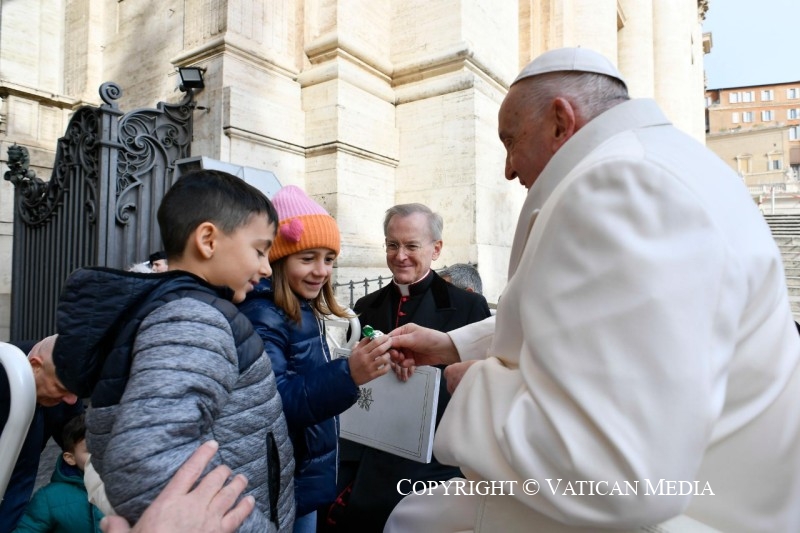Pope: in these dramatic times, let us rediscover and practise the virtues
Francis' invitation to the faithful in this morning's catechesis in St Peter's Square. "The saints are not exceptions of humanity. What a happy world would be one in which justice, respect, benevolence, broadmindedness were the shared normality". Prayer for peace with the rosary of a young man who died at the front.
Vatican City (AsiaNews) - "In these dramatic times of ours in which we often deal with the worst of humanity, virtuous action should be rediscovered and practiced by everyone. In a deformed world we must remember the form with which we were molded, the image of God that is imprinted in us forever."
Pope Francis said this today in the usual meeting with the faithful on Wednesday on the occasion of the general audience held in a sunny St. Peter's Square. Francis - who today marks the eleventh anniversary of his election - did not personally pronounce the text of his catechesis, entrusting its reading to a collaborator, Msgr. Pierluigi Giroli. After concluding the overview of vices last week, the pontiff invited us to turn our attention to the virtues, the other great chapter of this cycle of catechesis.
“The human heart - the Pope recalled - can indulge evil passions, it can listen to harmful temptations disguised with persuasive clothes, but it can also oppose all of this. As tiring as this may be, the human being is made for the good, which truly achieves it, and can also practice this art, ensuring that some dispositions become permanent in him or her."
“We would be off track – Francis explained – if we thought that the saints are exceptions to humanity: a sort of restricted circle of champions who live beyond the limits of our species. Saints, on the other hand, are those who fully become themselves, who realize the vocation of every man. What a happy world it would be in which justice, respect, mutual benevolence, broad-mindedness, hope were the shared normality, and not a rare anomaly."
Citing the Catechism of the Catholic Church which defines virtue as "a habitual and firm disposition to do good", the pontiff underlined how it is not "an improvised and somewhat casual good, which rains down from the sky in an episodic manner. History tells us that even criminals, in a moment of clarity, have performed good deeds; certainly these acts are written in the 'book of God', but virtue is something else. It is a good that arises from a slow maturation of the person, until it becomes an internal characteristic of him. Virtue is a habitus of freedom."
How, then, do we acquire virtue? “For the Christian – Francis replies – the first help is the grace of God. How many Christians have achieved holiness through tears, realizing that they are unable to overcome certain of their weaknesses. But they experienced that God completed that good work which for them was only a sketch." But at the same time "virtue grows and can be cultivated" through wisdom.
“The human being – concluded the Pope – is not a free territory for the conquest of pleasures, emotions, instincts, passions, without being able to do anything against these forces, sometimes chaotic, that inhabit it – it has him. A priceless gift that we possess is open-mindedness, it is the wisdom that knows how to learn from mistakes to direct life well. Then we need good will: the ability to choose the good, to shape ourselves with ascetic exercise, avoiding excesses."
Finally, personally addressing the Italian pilgrims, Francis invited everyone to "continue with commitment on the Lenten itinerary, ready to carry out gestures of Christian solidarity wherever Providence calls you to operate. And please - he added - let us persevere in fervent prayer for those who suffer the terrible consequences of war. Today they brought me a rosary and a Gospel of a young soldier who died at the front: he prayed with this. Many young people, many young people go to die. Let us pray to the Lord to give us the grace to overcome this madness of war which is always a defeat."







.png)










